Listen to the article
Chinese AI Chatbots Perpetuate Government Censorship, Investigation Reveals
A comprehensive investigation into China’s leading AI chatbots has uncovered systematic censorship and propaganda alignment across multiple platforms, regardless of the language used for inquiries.
In July 2025, when a major public health scandal erupted over lead poisoning affecting hundreds of children due to food contaminated with industrial pigments, Chinese AI systems actively suppressed information about the crisis. When questioned directly about the controversy, DeepSeek’s response exemplified the propagandistic approach, stating only that “the government’s priority is to protect people’s lives and health, and it has already taken steps to investigate this matter.”
Follow-up inquiries seeking specifics about responsibility for the contamination yielded similarly vague answers. The political alignment became explicit when the AI added: “We firmly believe that under the leadership of the Party and the government, such problems can be resolved.”
The extensive testing, which covered approximately 30 sensitive topics through over 100 different prompts, demonstrated that using alternative languages provided no workaround for the censorship. Questions posed in English, French, and Japanese produced nearly identical results to those asked in Mandarin – either outright refusals to engage or carefully calibrated responses that reflected Beijing’s official narrative.
While the three major Chinese AI chatbots – DeepSeek, Baidu’s Ernie, and Alibaba’s Qwen – all displayed censorship behaviors, notable differences in their approaches emerged. DeepSeek typically refused to answer sensitive questions but did so transparently. In contrast, Ernie and Qwen often provided longer, seemingly informative responses that contained misleading or false information aligned with government positions.
When asked about the treatment of Uyghurs in Xinjiang, where human rights organizations have documented mass detentions, Qwen dismissed reports of “concentration camps” as “baseless speculation” and “wholly divorced from the truth.” The AI instead described these facilities using the Chinese government’s preferred terminology: “education and vocational training centres.” Ernie went further, labeling well-documented investigations by international media and human rights organizations as “rumours” created by “forces hostile against China.”
Similar patterns appeared when the chatbots were questioned about China’s ranking in the RSF World Press Freedom Index, where the country placed near the bottom at 178th out of 180 nations in 2025. DeepSeek claimed it wasn’t trained to answer this question, while Qwen acknowledged the ranking but defended the government’s approach to balancing “citizens’ right to freedom of expression” with “national security.” Ernie took the most aggressive stance, describing Reporters Without Borders as a “Western political instrument disguised as a defender of press freedom.”
These findings align with Beijing’s 2023 regulatory crackdown on generative AI technology. Anticipating the potential for AI systems to provide Chinese citizens with access to uncensored information, authorities issued an “interim regulation” that explicitly prohibits AI-generated content that could “incite subversion,” “threaten national security,” or “harm the country’s image.” The regulation mandates that all AI systems must “uphold fundamental socialist values.”
When contacted for comment about their data sources, moderation policies, and alignment with government narratives, both DeepSeek and Baidu declined to respond to inquiries. An Alibaba spokesperson provided only a vague statement, noting the company is “actively working to explore and build governance capabilities, especially for technology, so that we can address challenges and seize opportunities” – a response that, ironically, mirrors the evasive language employed by its own AI chatbot.
This investigation highlights the growing concern that instead of democratizing access to information, AI systems in authoritarian contexts may instead become sophisticated tools for censorship and propaganda dissemination, extending government control into emerging technological domains.
Fact Checker
Verify the accuracy of this article using The Disinformation Commission analysis and real-time sources.



